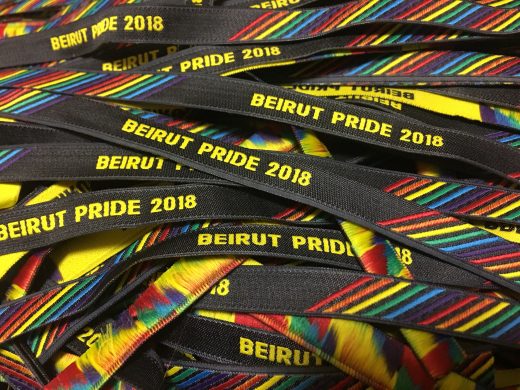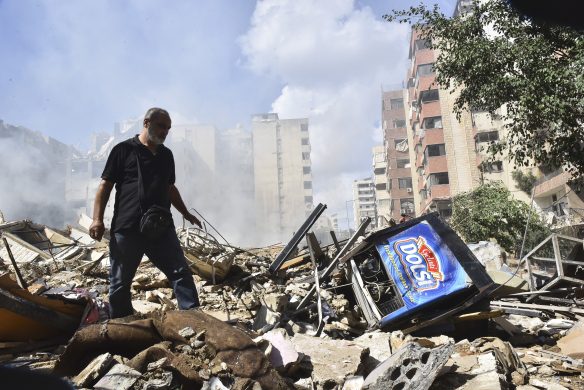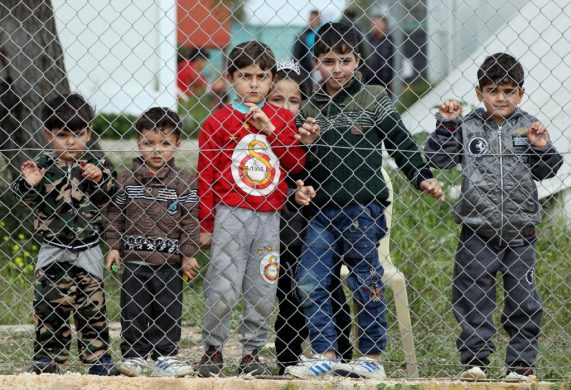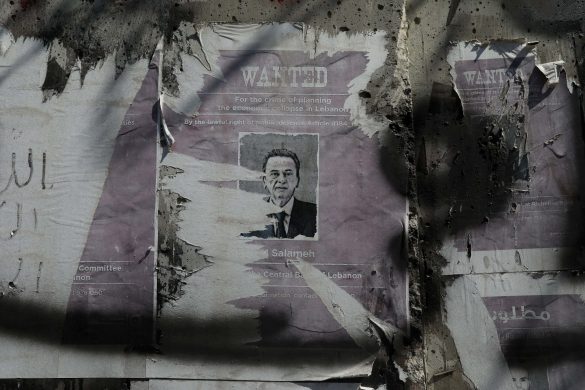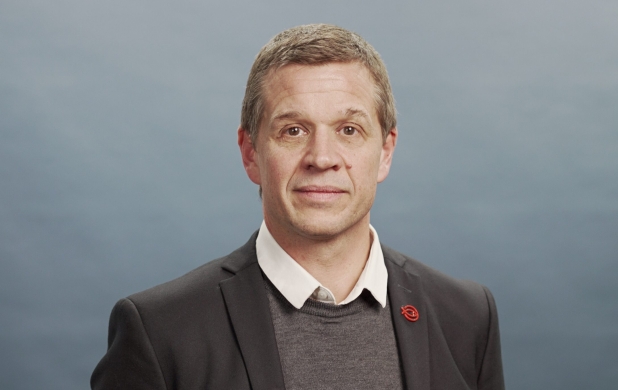Beirut Pride – Tro, håb og kærlighed
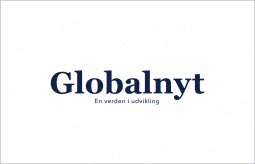
I anledning af Copenhagen Pride 2018 bringer Globalnyt temaet “Beirut Pride – Tro, håb og kærlighed”.
Her kan læseren møde manden bag Beirut Pride, Hadi Damien, og i en interviewserie på fire afsnit høre ham fortælle om fortiden, nutiden og fremtiden for Beirut Pride og LGBTQ+ i Libanon og regionen.
LGBTQ+ betyder “lesbian, gay, bisexual, transgender, queer” Plus-tegnet dækker over andre seksuelle identiteter.
Artikler i serien
Introduktion: En Pride er ikke bare en Pride (15.08.2018)
Afsnit 1: Hvordan det hele begyndte (16.08.2018)
Afsnit 2: Livet som LGBTIQ+ i Beirut (16.08.2018)
Afsnit 3: Beirut Pride 2018 – hvad sker der? (18.08.2018)
Afsnit 4: Tro, håb, kærlighed og nye vinde (18.08.2018)
Kulturguide: Libanons LGBT-scene (20.08.2018)
Beirut Pride is currently the only Pride in the Arab world, and we are contacted by several people from the GCC countries and countries in North Africa. It is a fresh breeze, and people are willing to engage with it, and have their own contribution. With Beirut Pride we have moved into action, horizontal action instead of vertical action, and this is when change happens. Our discourse is always inclusive; we mostly speak in English and Arabic, often in French as well; our channels of communication are always open; we don’t lecture and pretend to know it all; we have humility; we are kind, yet firm; we are honest; we don’t lie; we are consistent; we make things happen; we deliver; we don’t make Beirut Pride a career path; we are generous; we respect the specificity of our environments, and we don’t force our opinion on anyone. All these elements make people attracted to the model of Beirut Pride, and we start to see it being emulated. Beirut Pride has set a new discourse, a new dynamic, and people are aware of it.
Åbenhed omkring sin seksualitet
We acknowledge that figures are paramount to draft policies, but for the sake of this interview, we would rather speak of gender and sexual diversity instead of labels. The only common thing between two gay men, for example, is that both of them are attracted to men. Their taste in music, political views, economical orientation and religious affiliation are irrelevant. We are not advocating a lifestyle here, whereby if you do not adhere to specific guidelines you will be exempted from this category. We build an effective strategy when we focus on our similarities. Differences are what make diversity. We cannot ask people to endorse diversity, while we seek to a standardized identity within each one of the LGBTIQ letters. Sexuality is dynamic, identity is dynamic, and the human being is constantly in mental, emotional and physical evolution.
At blive i skabet eller at springe ud
Coming out is often a life-changing experience. It is liberating and is often a roller-coaster of emotions. If the parents are open, if they don’t manifest homophobic remarks and attitudes, if they are relaxed about signs and hints your throw at them, they coming out could not be so difficult. However, if your still live at home, and your family’s pressure is important to you and often gets to you, and if you cannot handle drama and be firm, and if you have no financial support, then coming out is to be reconsidered.
Our Lebanese society has been negatively conditioned when it came to homosexuality. Often would the Lebanese layman be mixing homosexuals with perverts, pedophiles, prostitutes, drug addicts, effeminate men, and criminals. Quite a stereotype that talk shows and TV series reinforced, depicting one profile to portray gay men. This does not mean that a gay man cannot be feminine or a sex worker or a drug user or a pedophile or a criminal or a pervert (whatever this means), but communicating this stereotyped image as the only one about homosexuals cannot do good to anyone, especially to a young man who is opening up to life. While mass media broadcasted a negative conditioning to the image of gay people in particular, religious authorities contributed to the background that cemented this perception.
Even though Christian and Muslim sacred texts do not mention same-sex intercourse, the latter was deemed unnatural, as it does not yield progeny, and religious scriptures have been interpreted in a way to condemn same-sex sexual practices and individuals who indulge in them. Reverberating on the perception of masculinity and of femininity, both masculine women and feminine men have been linked to homosexual conduct. Shamed and frowned upon, they have been subjected to unpleasant remarks, and, sometimes, to physical bullying. Oppressions that touch LGBTIQ+ in Lebanon are manifold, and depend on the social class, the education level, the professional status, the health condition, and so on. In other words, the life of a Lebanese gay man (for example) in Beirut Lebanon is similar to that of any other Lebanese citizen based in Beirut, in addition to expressions of hate and discrimination based on our sexual orientation.
LGBTIQ+ individuals are in all social classes, linguistic categories, professional circles, religious groups, political affiliations, cultural environment, etc. They are practicing and operating in all spheres, and this is the biggest asset to capitalise on to move forward. This is the reason Beirut Pride opened channels of communication with religious authorities, political parties, security officials and the business world. The only way for people to come out is when they know they will be protected from discrimination.
This is longterm work, and we are making progress. It is also a never-ending one as long as people reduce LGBTIQ+ individuals to sexed people only. In addition to sexual activity, sexuality comprises emotions, desires and relationships. Identifying as an LGBTIQ+ individual is one part of our identity.
This understanding, this comprehension, is paramount to move forward, to have a constructive discourse that LGBTIQ+ individuals and supporters could use to answer hate speeches.
The biggest action we can take is to be speak up. People who don’t discriminate are often quiet voices. They condemn online, on virtual platforms. They often don’t engage in conversations with those who discriminate, chosing to ignore them, as they don’t want to raise suspicion on being considered “LGBTIQ+ members because they support them”. There is also a detrimental belief that discussion is not relevant, and that no matter what, those who discriminate won’t listen. They chose to silent their voice. However, people who discriminate are loud, and express themselves on real platforms: they make phone calls, they speak to those who support in order to discredit them, they publish common statements that they massively broadcast on social media and WhatsApp, etc. The general perception of society would be that the opinions about LGBTIQ+ are all negative, that people who discriminate are a majority, and therefore that the society “is not ready” for this conversation. This is the first and most efficient thing that needs to be done. Communicate. Politely. Calmly. Intelligently.
We cannot move forward if we do not continuously educate ourselves. Do what you can. You can read, know history, draw parallelism with similar paths, be aware of the economical and geopolitical dynamics of where we live, so we be able to construct a vision, a strategic programme, and be the future. Embrace diversity, focus on what brings us together, and do not sweat small matters: people give what they have. Human beings are extremely rich, do not range them into labels. It never works. Be sensitive to your surroundings, always open channels of communication, and be generous. Be kind, yet firm, and trust that we are moving forward, no matter what. It is called evolution. We will get there, for we are genuine and authentic. Give people tools to feel empowered, and remember that the future is bright, no matter what, and that love always wins.
Libanesisk politik
People have empathy. They decide to ignore it sometimes though. Find their entry spot, and capitalize on it. We are all members of one society, and there is no other way bring to join forces, especially when we are the weakest element. People attack out of fear and misunderstanding. This is why education is paramount, and opening channels of communication is capital, no matter the number of rejections.
Beirut Pride was at the forefront of the LGBT political lobbying during the months leading up to the General Parliament elections of May 6, 2018. We, with political advisors, met individuals at leadership level of traditional and new political parties to speak LGBT with them. Today, more than 4 candidates who mentioned LGBT in their programme are members of Parliament, and many others are sensitive to the topic, capable of endorsing the file. It is still very early to speak about the effects of the newly elected Parliament, but it is counter-productive to approach “new” periods with fear and anxiety. We look at the bright side of things, and we capitalize on it.
People are attacked when they are visible, when they are organized. Attacks show that you are taken seriously, for the work you are spearheading is creating confusion among people who decide to stay in misunderstanding.
For example, when a fabricated Arabic version of the programme of Beirut Pride was sent to security officials over WhatsApp, containing words and expressions that insinuate acts of immorality and debauchery, the General Prosecutor of Beirut asked the Vice Squad to arrest me for interrogation. After a night spent in the holding cell, the interrogation proved that the programme was fabricated, and, upon the decision of the General Prosecutor of Beirut, the events scheduled until May 20 were suspended, to contain the buzz they had created. This does not mean Beirut Pride, in its manifold expressions and programmes, was cancelled. All the events that were suspended are being reinstalled, and the announced initiatives continue as before. New programmes are also shaping up. Beirut Pride continues. We didn’t start it to stop at the first obstacle, and obstacles are part of the path. Things are not dramatic, and while they are not amusing on the short term, they do not negatively affect the medium and the long terms.
Dette er afsnit 4 af 4 af temaet “Beirut Pride – tro, håb og kærlighed”.

